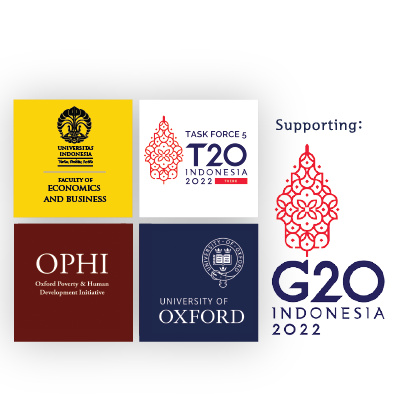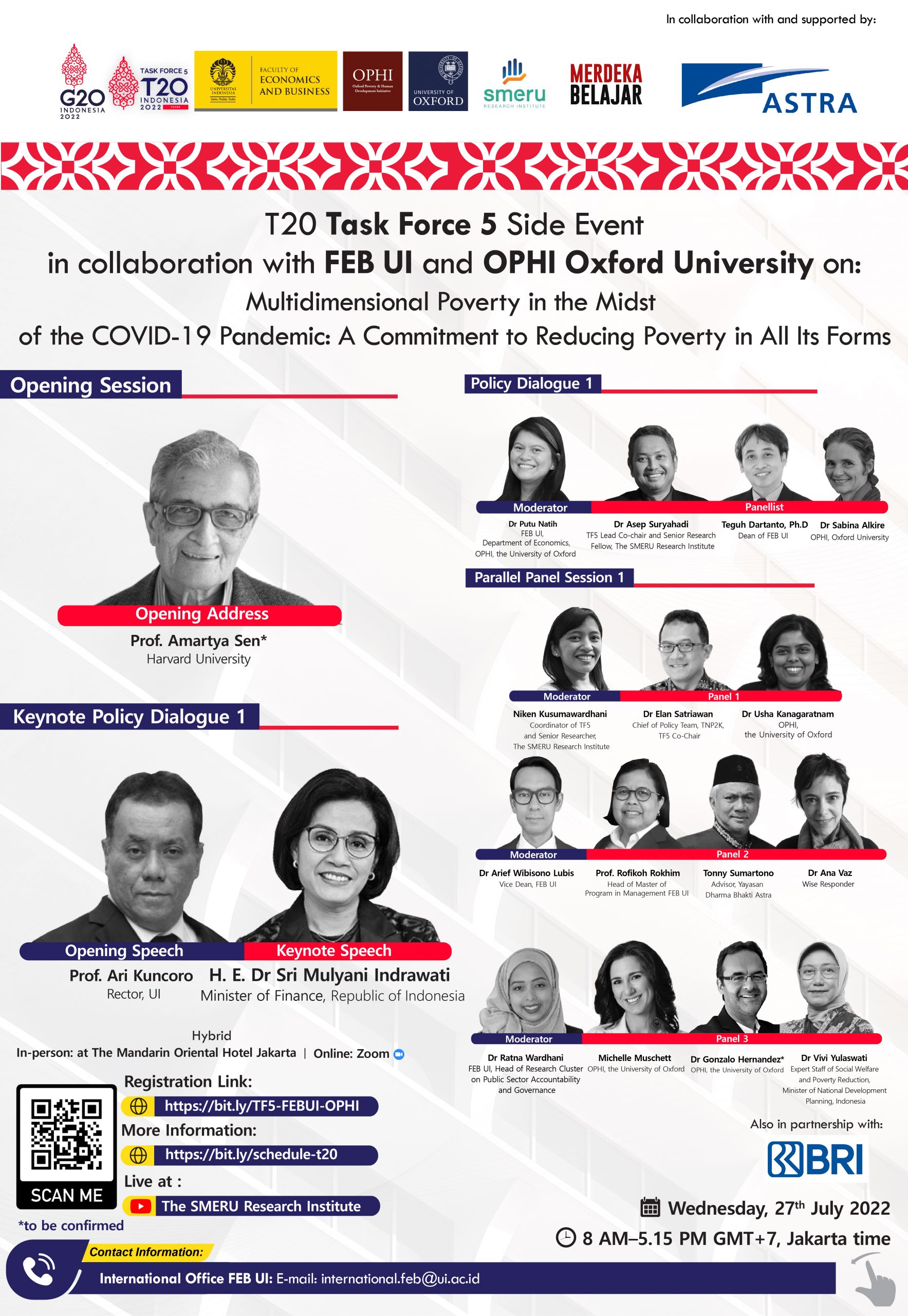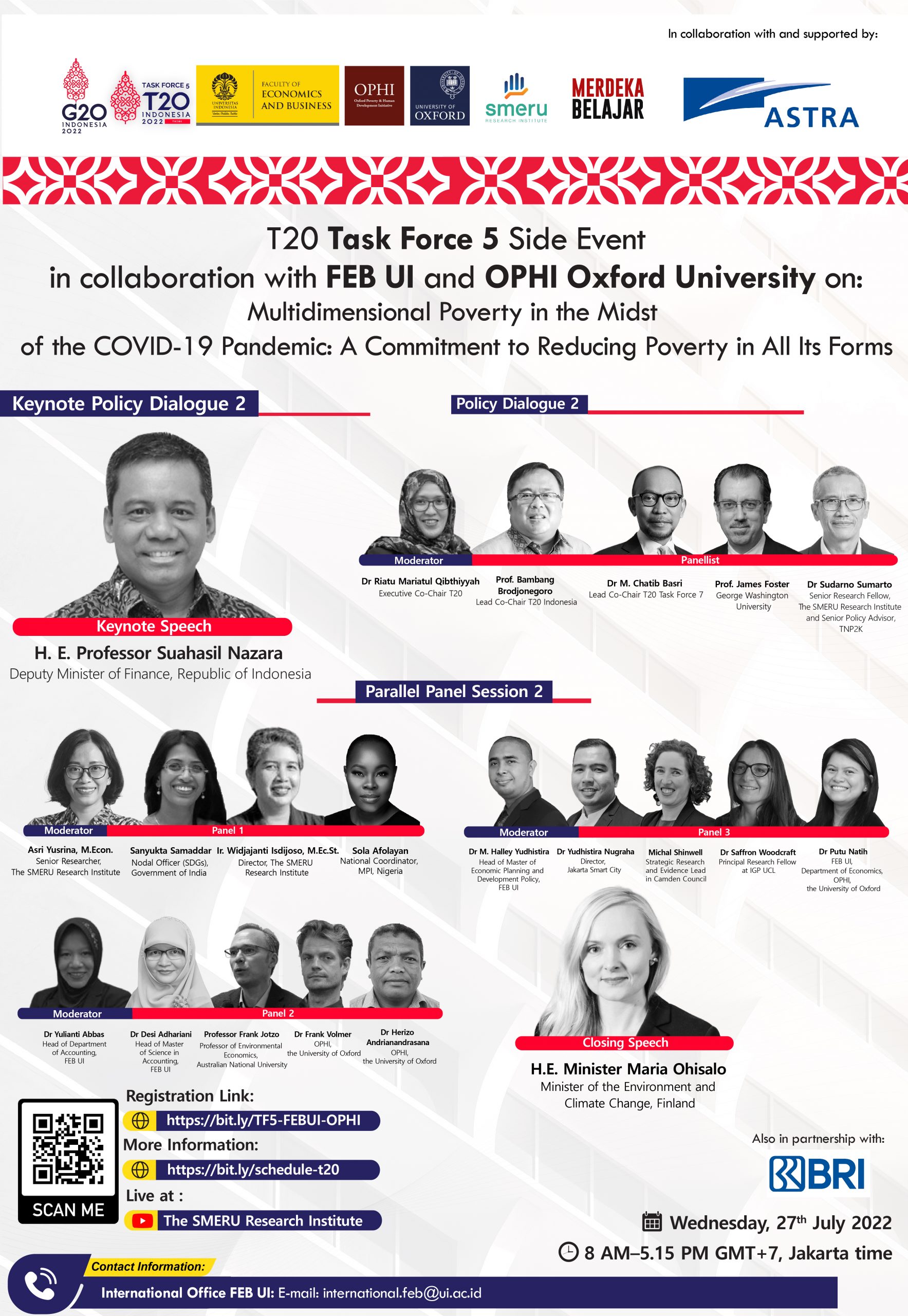The Faculty of Economics and Business, Universitas Indonesia (FEB UI) and the T20 Task Force 5 (TF5) team, in collaboration with the University of Oxford’s Oxford Poverty and Human Development Initiative (OPHI), are hosting a culminative Side Event, which acts as the final and concluding forum of a series of discussions led by the T20’s Task Force 5, on solutions and policy recommendations to the challenges G20 nations are facing with regard to poverty, inequality, human capital and wellbeing.
| Guest Speakers | Rundown |
|
1. Professor Amartya Sen (Harvard University).(*) Dr Putu Geniki Lavinia Natih (OPHI the University of Oxford and FEB UI) (moderator). |
Opening remarks (5 minutes): Dr Teguh Dartanto (Dean, FEB UI). Consultative dialogue: 25 minutes
|
| Guest Speakers | Rundown |
|
Opening Speech: Professor Ari Kuncoro (Rector, UI). Keynote Address: Professor Suahasil Nazara (Vice Minister of Finance, Republic of Indonesia)* Policy Dialogue: Moderator : |
Opening Speech: Professor Ari Kuncoro (Rector, Universitas Indonsia) Keynote Address: Professor Suahasil Nazara Opening: Dr Putu Natih Dialogue: Key Question 1 Dr Teguh Dartanto Q&A with audience |
| Guest Speakers | Rundown |
|
Dialogue format: Opening: Niken Kusumawardhani Questions to panellists: Question 1 (Dr Elan Satriawan): What are the key messages within the Communique? Do you think there are still missing aspects that still need to be considered within this document? Question 2 (Dr Usha Kanagaratnam): How can Multidimensional Poverty Measurement support the goals stated within the communique? Why is Multidimensional Poverty important? Q&A session with moderator Closing from Moderator. Link to Presentation material |
| Guest Speakers | Rundown |
|
1. Professor Rofikoh Rokhim (FEB UI). 2. Tonny Sumartono (Advisor, Yayasan Dharma Bhakti Astra). 3. Wise Responder Dr Arief Wibisono Lubis (Vice Dean, FEB UI) (moderator). |
Dialogue format: Opening: Dr Arief Wibisono Lubis
Questions to panellists: Question 1 (Professor Rofikoh Rokhim): What is the role of UMKM in maintaining welfare in the midst of the pandemic? How has the pandemic impacted this sector? What are key policy messages the government needs to think about with regard to supporting MSMEs? How can the MPI support these messages? (20 minutes) Question 2 (Bapak Tonny Sumartono): What is the role of the private sector, such as YDBA, in supporting MSMEs in Indonesia in the midst of the pandemic? (20 minutes) Question 3 (Dr Ana Vaz): Please tell us about Wise Responder? How can Wise Responder support the private sector in maintaining multidimensional wellbeing for company employees? Leading from the points shared by Prof Rofikoh and Pak Tonny’s on MSMEs, would Wise Responder’s method be useful for BRI (Indonesia’s largest state owned bank focusing on micro loans) and YDBA (one of Indonesia’s largest private sector based project supporting MSMEs)? Closing from Moderator (2 minutes). Link to Presentation material
|
| Guest Speakers | Rundown |
Dr Ratna Wardhani (FEB UI, Head of Research Cluster on Public Sector Accountability and Governance) (moderator). |
Dialogue format: Opening: Dr Ratna Wardhani Questions to panellists: Question 1 (Dr Gonzalo Hernandez): What was it like leading the development of a National MPI for Mexico? What were the main challenges you faced? How has this measure been pivotal to monitor development in Mexico? How can this process be adapted to measure building in the midst of the pandemic? (20 minutes) Question 2 (Michelle Muschett): What was it like leading the development of a National MPI for Panama? What were the main challenges you faced? How has this measure been pivotal to monitor development in Panama? (20 minutes) Question 3 (Dr Vivi Yulaswati): What are the main challenges Indonesia is facing with regard to monitoring welfare, targeting and social policies in the midst of the pandemic? How may broaders measures, such as the MPI support Indonesia is mitigating these challenges? Closing from Moderator (2 minutes). Link to Presentation material |
| Guest Speakers | Rundown |
|
Keynote Address: Prof Suahasil Nazara (Deputy Minister of Finance)
Policy Dialogue 1. Professor James Foster (George Washington University) 2. Professor Bambang Brodjonegoro (Lead Co-Chair T20) 3. Dr M. Chatib Basri (Lead Co-Chair T20 Task Force 7). 4. Dr Sudarno Sumarto (SMERU, TNP2K) Dr Riatu Mariatul Qibthiyyah (Executive Co-Chair T20) (moderator) |
Keynote Address: Professor Suahasil Nazara Consultative Dialogue Theme: The Capability Approach, Multidimensional Poverty and Policy Opening: Dr Riatu Mariatul Qibthiyyah Dialogue: |
Coffee will be delivered to tables (15.30-15.45)
| Guest Speakers | Rundown |
|
Dialogue format: Opening: Asri Yusrina
Questions to panellists: Question 1 (Dr Sanyukta Samaddar) (20 minutes): What was it like leading the development of a National MPI for India? What were the main challenges you faced? How has this measure been pivotal to monitor development in India? Question 2 (Sola Afolayan): What was it like leading the development of a National MPI for Nigeria? What were the main challenges you faced? How has this measure been pivotal to monitor development in Nigeria? Question 3 (Dr Widjajanti Isdijoso): Please let us know what the situation is with regard to social protection policies in Indonesia? Learning from India and Nigeria, how can the MPI support social protection policies in Indonesia? Q&A session Link to Presentation material |
| Guest Speaker | Rundown |
|
1. Dr Desi Adhariani (FEB UI). 2. Professor Frank Jotzo (Professor of Environmental Economics, Australian National University). 3. Dr Frank Volmer (OPHI, The University of Oxford). 4. Dr Herizo Andrianandrasana (OPHI, The University of Oxford).* Dr Yulianti Abbas (Department of Accounting, FEB UI) (moderator).
|
Dialogue format: Opening: Dr Yulianti Abbas
Questions to panellists: Question 1 (Dr Desi Adhariani): How do companies/ governments/ the public sector report the environmental impacts of their policies? What changes need to be made? How can awareness of the importance of taking into account these environmental impacts be increased? How can the MPI increase this awareness? Question 2 (Professor Frank Jotzo): How are the climate impacts of government policies taken into account? How can the MPI be used to guide macropolicies concerning the environment? Question 3 (Dr Charmian Love): How do companies/ governments/ the public sector report the environmental impacts of their policies? What changes need to be made? What is the future of environmental reporting?. Closing from Moderator. Link to Presentation material |
| Guest Speaker | Rundown |
|
1. Dr Yudhistira Nugraha (Jakarta Smart City). 2. Michal Shinwell (Camden City Council). 3. Dr Saffron Woodcraft (IGP UCL). Dr M. Halley Yudhistira (FEB UI), (moderator).
|
Dialogue format: Opening: Dr M. Halley Yudhistira Questions to panellists: Question 1 (Dr Saffron Woodcraft): What is the London Prosperity Project in Houston? How were citizens’ voices taken into account within this project? Why are democratic voice and live experiences important when measuring wellbeing and implementing policies? Question 2 (Dr Yudhistira Nugraha): How can technology and non-traditional data sources support the monitoring of wellbeing in urban areas during the pandemic? How can community voices be taken into account using these tools? What are the ethical and GDPR issues in this? Question 3 (Michal Shinwell): What were the challenges you faced during the pandemic regarding wellbeing monitoring and effective policy making? What was the Camden measuring inequality project? How did the Camden Measuring Inequality project help bring to light issues that needed to be addressed? Why was listening and being heard important within this project? Question 4 (Dr Putu Natih): Continuing on with Michal’s discussion, what was implemented in the Camden Measuring Inequalities project? Why was democratic voice important in this project? What policy recommendations came out of this project?. Closing from Moderator. Link to Presentation material |
H.E. Minister Maria Ohisalo
Minister of the Environment and Climate Change, Finland



